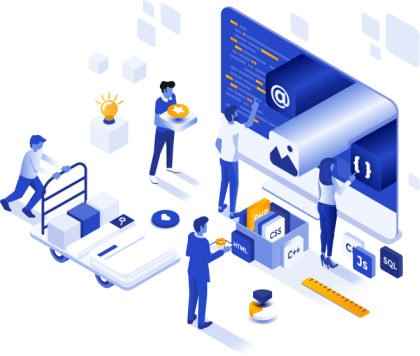Integrations
Adaca assists businesses in integrating systems with a unique, repeatable process enabling optimisation of internal processes with technology.

United Nations
Swiss Government
Prospa
Qantas
IAG
EY
ANZ Bank
Beamtree
Introducing
Integrations
Connecting disparate systems is key to efficient workflows. However, integrating interfaces, data structures, and APIs can be complex. We make it simple.
Our integration experts design and implement robust interconnections between your business-critical applications. This powers automated workflows and a unified system landscape.
Step 1
API Integration
We leverage API integrations to link systems and enable seamless data sharing. Our team is highly experienced across integration platforms and protocols including REST, SOAP, and OpenAPI.
We work closely with your developers to connect APIs in a secure and scalable architecture. Integrations are optimised for performance and built to handle high transaction volumes.
Step 2
Custom Integrations
Where APIs are not available, we develop specialised integrations to bridge gaps between systems. Leveraging tools like MuleSoft, we can integrate on-premise and cloud applications quickly and securely.
We build reusable integration interfaces that simplify future system connections. Our tailored integrations help you avoid costly and inflexible vendor-driven integrations.
Step 3
Automation and Orchestration
With connections established, we automate cross-system workflows. Integration triggers like file uploads or database changes are configured to initiate related transactions.
Powerful tools like Zapier, Workato and Microsoft PowerAutomate enable us to rapidly automate workflows across integrated apps. We optimise automation pipelines for seamless handoffs between your critical business systems.
System interdependence demands robust integrations. Our experts deliver future-proof solutions to unify systems, data, and processes across your digital ecosystem.
Our Services
Automation
Automate business processes using custom software solutions.
Integrations
Develop custom integrations between off-the-shelf platforms.
Artificial Intelligence
Deliver bespoke artificial intelligence solutions including training for your team.
Software Development
Build teams of dedicated senior software developers.
Resource Augmentation
Augment your existing development team with additional resources.

Case Studies

ShoreTrade
ShoreTrade developed a technology solution that connected buyers with sellers in the seafood industry to facilitate digital trade.

ANZ Bank
ANZ Bank developed a reporting engine during the Royal Commission into Misconduct in the Financial Services Industry.

World Food Programme
World Food Programme developed a data analytics platform tracking conflict sensitivity in countries receiving aid.
Our Process
1
Planning
We begin by consulting businesses to understand the unique outcomes they would like to achieve.
Design
Once we have all the required information, we get to work designing the software’s framework and build out from there.
2
Implementation
Once all design and coding is completed, the software is able to be reviewed.
3
Testing
Any defects are identified and resolved, and a demonstration of the product is carried out with the client.
4
Launch
Once all parties are satisfied with the finished product, it is deployed into the real world and maintained on an ongoing basis by our team.
5

Join 100+ companies that have trusted Adaca with their technology
Including top companies backed by:
Get started with Adaca today
Join over 100 companies managing their technology delivery with Adaca.
Frequently Asked Questions
How early in the technology development process can you get involved?
Adaca can get involved at any stage of the technology development process. As part of the software development life cycle, Adaca can provide exploratoration services to ensure the business processes you are looking to automate with technology are scoped accordingly. However, we can also contibute at any stage following this, too.
How long does it take to mobilise a team?
The exact time to mobilise a team can vary depending on a project’s programming language requirements and availability of talent. Software developers in some cases can be mobilised in as quickly as 2 to 3 business days after an engagement with Adaca commences. We recommend accounting for up to 30 days if your requirements are more unique.
Adaca has a unique model whereby our recruitment team is constantly sourcing and vetting talent for the most common programming languages, meaning these resources can be mobilised faster.
How qualified are the software developers?
Adaca hires only senior software developers with a minimum of 7 years’ commercial experience as well as a Bachelor’s degree. Our over 100 developers have undertaken a unique recruitment process that has been designed to find the best quality talent and to retain them.
What if there is no available talent?
Adaca has never had an issue finding the right talent for a project. With over 10 years of experience, and a talent pool within a population of over 110 million people, we have consistently been able to find incredible talent for all projects we undertake.
What happens if a developer isn't suitable for our project?
Adaca offers a 30 day replacement guarantee, where if a developer is not suitable for your project, we will replace them completely free of charge. We will also ensure an overlap with the original developer to allow all materials to be handed over, minimising the operational risk to your business.
What programming languages do you offer?
Adaca supports all major programming languages, including but not limited to TypeScript, JavaScript, Python, .NET, Go, Java, PHP, iOS, and Android. We are also well equipped in all major frameworks such as React, React Native, Node JS, Kotlin, Laravel, and Drupal.
You can find a list of our most commonly supported programming languages here.
What level of reporting can I expect?
Adaca can either provide you with a project manager or educate your team on strong technology management processes. The reporting this generally includes differs from team to team. We are capable of providing reports such as Gantt charts, changelogs, weekly agendas, end of week updates, testing plans, decision registers, risk registers, timesheets, project plans, resource registers, and release documents.
If your question isn’t answered, get in touch with us to learn more.
